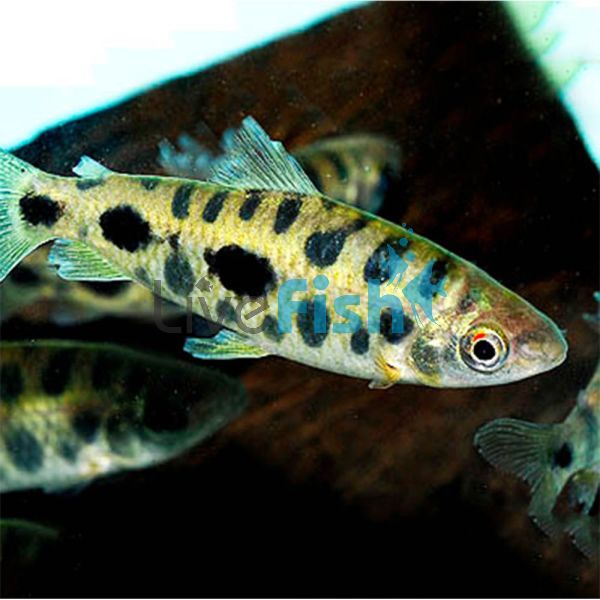Spotted Leporinus 4cm
The spotted leoprinus is a fantastic, underrated fish to add to a South American community aquarium. These wild-looking fish are active, shoal really well and have stunning colours that would suit a biotope or fish-only system perfectly. They are fish that isn’t all that common either in home aquariums and only reach around 15 cm when fully grown.
Spotted Leporinus
The spotted leoprinus is a fantastic, underrated fish to add to a South American community aquarium. These wild-looking fish are active, shoal really well and have stunning colours that would suit a biotope or fish-only system perfectly. They are fish that isn’t all that common either in home aquariums and only reach around 15 cm when fully grown.
Spotted leporinus get their name from the characteristic black spotting they have that runs from head to tail. The intensity of black is really most prominent across the lateral line where they have large round spots, above and below this the spots can lighten and elongate to look more like loose banding. No two fish have the exact same pattern which makes it really interesting to see. The body colour is an array of earthy colours predominately a light brown which has streaks of yellow, orange, green, and darker browns. Especially near the nape of the body and cheek plate, the iridescent green sheen is really prominent. For this size these fish are, they have comically large eyes as well with a relatively small mouth.
Whilst spotted leporinus have been bred in captivity though the information is quite limited, these are egg-laying fish with reports suggesting that the parents will create a nest and guard the laid eggs until they hatch. Sexing these fish is also quite difficult as males and females have no distinguishing factors either, the best bet to breed this species would be to put them in a species-only tank and trigger spawning through feeding high protein foods, doing water changes, and temperature fluctuations.
Tank Recommendations for your Spotted Leporinus
As the spotted leporinus do reach around 15 cm, but more importantly are incredibly active it is best to keep them in an aquarium with a minimum volume of 200 litres. This ensures that they can be kept in a trio which would be the bare minimum school whilst also having ample swimming space as well. These fish are not plant-safe and will basically shred or eat any plant added to the aquarium. They are mostly mid to top water-dwelling fish so the choice of substrate and aquarium hardscape is not a major concern. They are however excellent jumpers so a tight-fitting lid is a must for the aquarium. These are also tropical fish that are best kept at 24-26 degrees.
Suitable Tank Buddies
The spotted leporinus is a peaceful fish and can generally be kept with smaller and larger peaceful fish. It is however best to avoid slow-moving nano fish that would fit in their mouth, there are also reports that spotted leporinus can be severe fin nippers so avoiding long-finned species is also ideal.
Usually Compatible
Severum, Geophagus, corydoras, plecos, rainbowfish, large tetras, Raphael catfish, and other fast-moving or medium to larger-sized, peaceful community fish.
Sometimes Compatible
Angelfish, oscars, discus, black widow tetras, and other semi-aggressive, long-finned, or slower-moving fish.
Rarely Compatible
Aggressive species may prey on the spotted leporinus. Any incredibly small species such as shrimp and neon tetras should be avoided as they may be eaten by the leporinus.
Feeding your Spotted Leoprinus
Spotted Leoprinus will take to aquarium foods very easily. They will take a wide range of pellets, flakes, and frozen foods. By giving them a varied diet, it ensures that they have optimal nutrition. The ideal diet would be good quality floating food, supplemented with green and veggie matter like lettuce, zuchinni, and even pumpkin.
| Scientific Name | Leporinus maculatus |
|---|---|
| Care Level | Easy |
| Common Names | Spotted Leporinus, Leopard Leporinus |
| Diet | Omnivore |
| Fish Family | Anostomidae |
| Lifespan (years) | 9 |
| Max. Length (cm) | 15 |
| Min. Tank Volume (l) | 200 |
| Origin | South America |
| Reef Safe | No |
| Sociability | Peaceful |
| Venomous | No |
| Water Conditions | 24-28° C, pH 6.5-7.0 |




